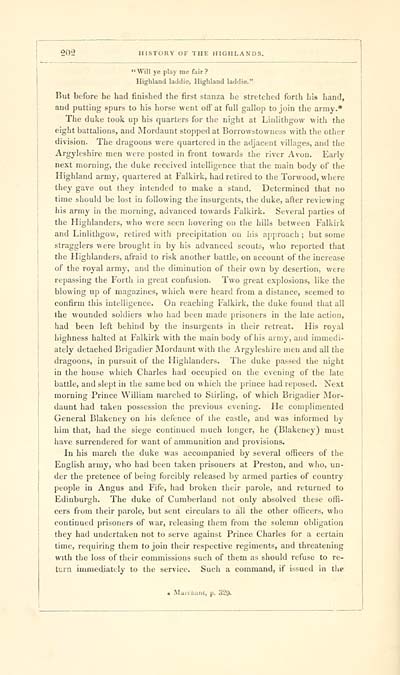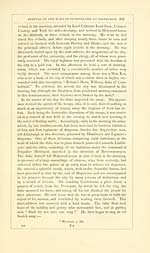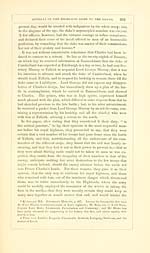Download files
Complete book:
Individual page:
Thumbnail gallery: Grid view | List view

202 HISTORY OF THE HIGHLANDS.
"Will ye play me fair?
Highland laddie, Highland laddie/'
But before he had finished the first stanza he stretched forlh Ijis Iiand,
and putting spurs to his horse went ofT at full gallop to join tlic army.*
The duke took up his quarters for the night at Linlithgow with the
eight battalions, and Mordaunt stopped at Borrowstowness with the other
division. The dragoons were quartered in the adjacent villages, and the
Argylcshire men were posted in front towards the river Avon. Early
next morning, the duke received intelligence that the inain body of the
Highland army, quartered at Falkirk, had retired to the Torwood, wiiere
they gave out they intended to make a stand. Determined that no
time should be lost in following the insurgents, the duke, after reviewing
his army in the morning, advanced towards Falkirk. Several parties of
the Highlanders, who were seen hovering on the hills between Falkirk
and Linlithgow, retired with precipitation on his approach ; but some
stragglers were brouglit in by his advanced scouts, who reported that
the Highlanders, afraid to risk another battle, on account of the increase
of the royal army, and the diminution of their own by desertion, were
repassing the Forth in great confusion. Two great explosions, like the
blowing up of magazines, which were heard from a distance, seemed to
confirm this intelligence. On reaching Falkirk, the duke found that all
the wounded soldiers who had been made prisoners in the late action,
had been left behind by the insurgents in their retreat. His royal
highness halted at Falkirk with the main body of his armj', and immedi-
ately detached Brigadier Mordaunt with the Argyleshire men and all the
dragoons, in pursuit of the Highlanders. The duke passed the night
in the house which Charles had occupied on the evening of the late
battle, and slept in the same bed on which the prince had reposed. Next
morning Prince William marched to Stirling, of which Brigadier Mor-
daunt had taken possession the previous evening. He complimented
General Blakeney on his defence of the castle, and was informed by
him that, had the siege continued much longer, he (Blakeney) must
have surrendered for want of ammunition and provisions.
In his march the duke was accompanied by several officers of the
English army, who had been taken prisoners at Preston, and who, un-
der the pretence of being forcibly released by armed parties of country
people in Angus and Fife, had broken their parole, and returned to
Edinburgh. The duke of Cumberland not only absolved these offi-
cers from their parole, but sent circulars to all the other officers, who
continued prisoners of war, releasing them from the solemn obligation
they had undertaken not to serve against Prince Charles for a certain
time, requiring them to join their respective regiments, and threatening
witli the loss of their commissions such of them as should refuse to re-
turn iuimediately to the service. Such a command, if issued in the
. MauiialU, p. 329.
"Will ye play me fair?
Highland laddie, Highland laddie/'
But before he had finished the first stanza he stretched forlh Ijis Iiand,
and putting spurs to his horse went ofT at full gallop to join tlic army.*
The duke took up his quarters for the night at Linlithgow with the
eight battalions, and Mordaunt stopped at Borrowstowness with the other
division. The dragoons were quartered in the adjacent villages, and the
Argylcshire men were posted in front towards the river Avon. Early
next morning, the duke received intelligence that the inain body of the
Highland army, quartered at Falkirk, had retired to the Torwood, wiiere
they gave out they intended to make a stand. Determined that no
time should be lost in following the insurgents, the duke, after reviewing
his army in the morning, advanced towards Falkirk. Several parties of
the Highlanders, who were seen hovering on the hills between Falkirk
and Linlithgow, retired with precipitation on his approach ; but some
stragglers were brouglit in by his advanced scouts, who reported that
the Highlanders, afraid to risk another battle, on account of the increase
of the royal army, and the diminution of their own by desertion, were
repassing the Forth in great confusion. Two great explosions, like the
blowing up of magazines, which were heard from a distance, seemed to
confirm this intelligence. On reaching Falkirk, the duke found that all
the wounded soldiers who had been made prisoners in the late action,
had been left behind by the insurgents in their retreat. His royal
highness halted at Falkirk with the main body of his armj', and immedi-
ately detached Brigadier Mordaunt with the Argyleshire men and all the
dragoons, in pursuit of the Highlanders. The duke passed the night
in the house which Charles had occupied on the evening of the late
battle, and slept in the same bed on which the prince had reposed. Next
morning Prince William marched to Stirling, of which Brigadier Mor-
daunt had taken possession the previous evening. He complimented
General Blakeney on his defence of the castle, and was informed by
him that, had the siege continued much longer, he (Blakeney) must
have surrendered for want of ammunition and provisions.
In his march the duke was accompanied by several officers of the
English army, who had been taken prisoners at Preston, and who, un-
der the pretence of being forcibly released by armed parties of country
people in Angus and Fife, had broken their parole, and returned to
Edinburgh. The duke of Cumberland not only absolved these offi-
cers from their parole, but sent circulars to all the other officers, who
continued prisoners of war, releasing them from the solemn obligation
they had undertaken not to serve against Prince Charles for a certain
time, requiring them to join their respective regiments, and threatening
witli the loss of their commissions such of them as should refuse to re-
turn iuimediately to the service. Such a command, if issued in the
. MauiialU, p. 329.
Set display mode to: Large image | Transcription
Images and transcriptions on this page, including medium image downloads, may be used under the Creative Commons Attribution 4.0 International Licence unless otherwise stated. ![]()
| Early Gaelic Book Collections > Ossian Collection > History of the Highlands and of the Highland clans > Volume 3 > (236) |
|---|
| Permanent URL | https://digital.nls.uk/79655254 |
|---|
| Description | Vol. III. |
|---|---|
| Shelfmark | Oss.249 |
| Attribution and copyright: |
|
| Description | Selected books from the Ossian Collection of 327 volumes, originally assembled by J. Norman Methven of Perth. Different editions and translations of James MacPherson's epic poem 'Ossian', some with a map of the 'Kingdom of Connor'. Also secondary material relating to Ossianic poetry and the Ossian controversy. |
|---|
| Description | Selected items from five 'Special and Named Printed Collections'. Includes books in Gaelic and other Celtic languages, works about the Gaels, their languages, literature, culture and history. |
|---|

